AI Answer Evaluation Platform Live Now. Try Free Answer Evaluation Now
Ethnopoetics
Ethnopoetics, as a literary and anthropological term, refers to the study and interpretation of non-western oral literatures or “ethnographic texts”, including indigenous or tribal poetries and stories. It is a critical approach that prioritizes the original linguistic and cultural context of such texts, preserving and presenting them in a manner that echoes their innate form and rhythm [1].

Understanding Ethnopoetics
Origin of Ethnopoetics
Jerome Rothenberg, an American poet and translator, is commonly recognized as the initiator of the term “ethnopoetics” in the late 1960s. He aimed to acknowledge the value and complexity of non-western, often indigenous, poetries that were typically overlooked or trivialized by mainstream literary studies [2].
Ethnopoetics and Anthropology
From an anthropological perspective, ethnopoetics offers an in-depth understanding of different cultures through their native literary practices. The ways in which people from varying cultures express their experiences, emotions, and worldview through literature can offer profound insights into their societal structures, beliefs, and values [3].
Key Principles of Ethnopoetics
- Preservation of Original Form: Ethnopoetics emphasizes preserving the original linguistic and cultural context of the text. This includes maintaining the format, rhythm, and oral traditions inherent in the text [4].
- Contextual Understanding: It focuses on understanding the socio-cultural background of the text to fully grasp its meanings and implications.
- Integration of Anthropology and Literature: Ethnopoetics weaves together literary studies with anthropological analysis, bringing forth a multidimensional understanding of the text.
- Inclusivity and Decolonization: It seeks to counteract the Eurocentric bias in traditional literary studies, acknowledging and validating the literary contributions of non-western cultures [5].
Ethnopoetics Methodology
| Stages | Description |
|---|---|
| Collection | Gathering oral literatures from the ethnographic group |
| Transcription | Carefully transcribing the oral text, preserving its original characteristics |
| Translation | Translating the text in a way that retains its inherent cultural essence |
| Interpretation | Applying cultural understanding to interpret the text meaningfully |
Significance of Ethnopoetics in Anthropological Research
Ethnopoetics as a Cultural Lens
Anthropology, at its core, is a study of human societies and cultures. Ethnopoetics, through its emphasis on cultural and linguistic context, provides a unique lens to explore different cultures [6].
Documenting Oral Traditions
Ethnopoetics plays a vital role in documenting and preserving the rich oral traditions of indigenous and tribal communities. These texts are often vulnerable to being lost due to factors like urbanization, language erosion, and cultural assimilation.
Resisting Eurocentric Bias
Ethnopoetics counters the hegemonic Eurocentric bias in literary studies, contributing to the decolonization of literature. It advocates for an equitable appreciation of all global literatures, regardless of their origin.
Case Studies in Ethnopoetics
Appreciating the importance of ethnopoetics in anthropological research is enhanced through a review of its practical applications. Here are two key examples illustrating the transformative power of this methodology.
Zuni Narrative Poetry
In his landmark work, “Finding the Center: Narrative Poetry of the Zuni Indians,” Dennis Tedlock [2] provides an influential example of ethnopoetics at work. Tedlock explores Zuni oral narratives, presenting them in a bilingual format that maintains the original linguistic features and phonetic rhythms. His deep understanding of Zuni culture allows for nuanced, culturally sensitive translations, emphasizing the centrality of narrative poetry to Zuni culture and social organization.
Yaqui Deer Songs
In “Yaqui Deer Songs: Maso Bwikam,” Larry Evers and Felipe Molina [3] delve into the rich tradition of Yaqui deer singing, a cornerstone of Yaqui cultural identity and cosmology. Adopting an ethnopoetic approach, they offer bilingual presentations of the songs, keeping the original form intact. The work also contextualizes the songs within the larger Yaqui worldview, providing a vivid portrait of Yaqui culture and spirituality.
Challenges and Future Directions in Ethnopoetics
Despite its vital contributions, ethnopoetics also faces several challenges that need to be addressed moving forward.
Cultural Appropriation
While ethnopoetics aims to celebrate non-western literatures, it runs the risk of cultural appropriation. Researchers must remain vigilant to ensure that these cultural expressions are presented respectfully, without commodifying or misrepresenting them.
Ensuring Inclusivity
As it strives to amplify marginalized voices, ethnopoetics must ensure that it does not inadvertently exclude certain communities. Continued efforts are required to seek out, document, and interpret literatures from diverse cultural backgrounds.
Embracing Technology
In the digital age, ethnopoetics must adapt to new technologies for gathering, transcribing, translating, and interpreting texts. Innovative methods like digital storytelling and computational linguistics can enhance the ethnopoetic process and make it more accessible.
Conclusion
Ethnopoetics offers a unique and powerful methodology for anthropological research. By integrating literature with anthropology, it enables a deeper, more nuanced understanding of human cultures. As ethnopoetics continues to evolve and adapt, it will undoubtedly continue to shed light on the myriad ways in which humans interpret and articulate their experiences.
References
[1] Rothenberg, J. (1968). Technicians of the Sacred: A Range of Poetries from Africa, America, Asia, Europe and Oceania. University of California Press.
[2] Tedlock, D. (1972). Finding the Center: Narrative Poetry of the Zuni Indians. Dial Press.
[3] Evers, L., & Molina, F. (2001). Yaqui Deer Songs: Maso Bwikam. The University of Arizona Press.
[4] Hymes, D. (1981). “In Vain I Tried to Tell You”: Essays in Native American Ethnopoetics. University of Pennsylvania Press.
[5] Bright, W. (1993). A Coyote Reader. University of California Press.
[6] Gumperz, J., & Hymes, D. (1986). Directions in Sociolinguistics: The Ethnography of Communication. Blackwell. http://dx.doi.org/10.1002/9781118611463.wbielsi119




